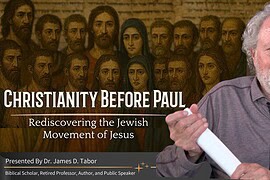I wanted to share with my readers the translation of an ancient text, known in various Greek manuscripts as well as Aramaic fragments found among the Dead Sea Scrolls, with which many might not be familiar. It seems to capture in a few lines the core of ideas of the sort of Messianic Vision that fired the peoples of Judea and Galilee in the generations before the destruction of the Temple in 70 CE.

For students of the New Testament, who focus on the messianic ideas of John the Baptizer and Jesus, this text seems to me to be primary. The setting is an interpretation of the famous “Seventy Weeks” prophecy of Daniel 9: 24-27. The author interprets each “week” as a Jubilee, and characterizes the final seventh week as utterly corrupt: “And in the seventh week the priests will become idolaters, fighters, lovers of money, proud, lawless, licentious, abusers of children and beasts” (T. Levi 17:11 Evans Pseudepigrapha). This is then followed by what can only be called a glorious Messianic Kingdom. What I find most noteworthy about this text is the way in which the roles of the ideal Priest and Davidic King are merged into one–much as the Christians later did with Jesus. This is a feature we find throughout the Testament of the Twelve Patriarchs, where this text is found, based on a merging of texts such as Numbers 14:17 “A star shall come forth out of Jacob, and a scepter shall rise out of Israel.” Salvation is expected to arise from a single figure who is a merging of the tribes of Judah and Levi into one “Savior.” For more background on this notion of one, two, or even three Messiah figures see my post on “Two Messiahs.” Take a look at this text, note the ideas and images it reflects, and I think you will have much insight into the hopes and expectations of many of those in the time of Jesus who heard his proclamation: “The time is at hand! The Kingdom of God is drawn near! Repent and believe the Good News!” In some ways this is the entire New Testament, the rest is commentary!
Levi 18:1 And after their punishment from the Lord, the priesthood will fail. 2 Then the Lord will raise up a new priest, to him all the words of the Lord will be revealed. And he will execute truthful judgment upon the earth for a multitude of days. 3 And his star will arise in heaven as a king, lighting up the light of knowledge as with the sun of day. And he will be magnified in the world [until his ascension]. 4 He will shine brightly as the sun to the earth, and will remove all darkness from under heaven, and there will be peace in all the earth. 5 The heavens will rejoice in his days, and the earth will be glad, and the clouds will celebrate. And the knowledge of the Lord will be poured upon the earth like the water of the seas; and the angels of glory of the presence of the Lord will rejoice in him. 6 The heavens will be opened, and from the temple of glory sanctification will come upon him, with the Father’s voice as from our father Abraham to Isaac. 7 And the glory of the Most High will be spoken over him, and the spirit of understanding and holiness will rest upon him [in the water]. 8 He will give the majesty of the Lord to his sons in truth for eternity. And none will succeed him for all generations for eternity. 9 And to his priesthood the nations will be multiplied in knowledge upon the earth, and enlightened through the grace of the Lord: and Israel will decline to ignorance and will be darkened in mourning: his priesthood will fail, all sin and lawlessness will rest from evil. [And the righteousness will rest in him.] 10 And he will open the gates of paradise, and will place the threatening sword against Adam. 11 And he will give the saints to eat from the tree of life, and the spirit of holiness will be on them. 12 And Beliar will be bound by him, and he will give authority to his children to trample upon the evil spirits. 13 And the Lord will rejoice in his children, and the Lord will be pleased in his beloved ones for eternity. 14 Then Abraham and Isaac and Jacob will rejoice, and I will be glad, and all the holy ones will clothe themselves with joy. (T. Levi 18: 1-14, Evans, Pseudepigrapha).









Comments are closed.